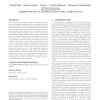Free Online Productivity Tools
i2Speak
i2Symbol
i2OCR
iTex2Img
iWeb2Print
iWeb2Shot
i2Type
iPdf2Split
iPdf2Merge
i2Bopomofo
i2Arabic
i2Style
i2Image
i2PDF
iLatex2Rtf
Sci2ools
97
Voted
PODS
2010
ACM
2010
ACM
Understanding queries in a search database system
It is well known that a search engine can significantly benefit from an auxiliary database, which can suggest interpretations of the search query by means of the involved concepts and their interrelationship. The difficulty is to translate abstract notions like concept and interpretation into a concrete search algorithm that operates over the auxiliary database. To surpass existing heuristics, there is a need for a formal basis, which is realized in this paper through the framework of a search database system, where an interpretation is identified as a parse. It is shown that the parses of a query can be generated in polynomial time in the combined size of the input and the output, even if parses are restricted to those having a nonempty evaluation. Identifying that one parse is more specific than another is important for ranking answers, and this framework captures the precise semantics of being more specific; moreover, performing this comparison between parses is tractable. Las...
Related Content
| Added | 10 Jul 2010 |
| Updated | 10 Jul 2010 |
| Type | Conference |
| Year | 2010 |
| Where | PODS |
| Authors | Ronald Fagin, Benny Kimelfeld, Yunyao Li, Sriram Raghavan, Shivakumar Vaithyanathan |
Comments (0)

